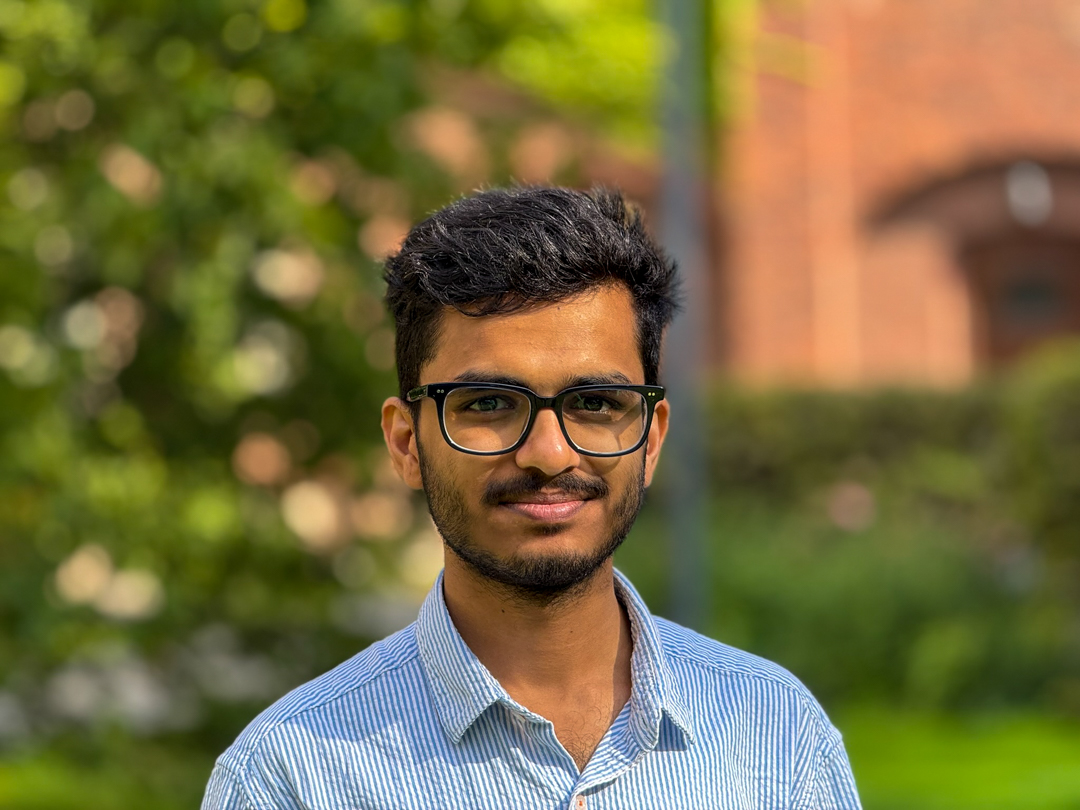Manoj
Manoj is from Bengaluru, India. Before coming to KTH, he worked as a design engineer after graduating with a bachelor’s degree in Mechanical Engineering from PES University, Bengaluru. He enjoys playing sports and board games, urban and nature hiking, exploring new technologies, and seeking meaningful experiences, while trying to limit digital media consumption.

Why did you choose this master's programme at KTH?
KTH stood out as one of the few highly ranked European universities offering a well-structured MSc in Engineering Mechanics, supported by cutting-edge research and close ties to industry. The curriculum is thoughtfully designed, with courses that build on each other and allow flexibility through various electives. Core courses typically include labs or project components, reinforcing concepts and developing engineering intuition – a perfect stepping stone to start new research. KTH's reputation, international community, and sustainability-focused research ecosystem aligned perfectly with my long-term goal of working on engineering problems with societal value. I believe being part of this programme will provide a platform to develop professionally, build a global network, and equip me with skills and perspectives to make meaningful contributions in industry and research.
Have you chosen a specialisation track within the programme? Which track and why?
Yes, I chose the Fluid Mechanics track as it aligns closely with my long-standing interest in computational flow simulation, which began during my undergraduate research and extracurricular projects. I've been fascinated by aerodynamics, fluid-structure interactions, and thermofluids, especially in aerospace, automotive, and energy applications. The track offers a deeper dive into core areas like turbulence, compressible flows, and numerical methods, which are critical in industrial and research domains. One of the strengths of this programme is its flexibility – despite choosing a specific track, we can explore various electives. This allows students to tailor their learning path based on their interests and career goals while supporting multidisciplinary thinking. I've taken advantage of this by choosing courses such as applied CFD, FEM, flow acoustics, biomechanics, and data-driven methods.
What are some of your favourite courses so far?
I enjoyed the Turbulence course; it is fascinating and exposed me to various research avenues. I especially liked the CFD course, which taught about the numerical modelling approaches to building CFD codes. The applied CFD and FEM courses allowed us to explore various intricacies in using commercial software to solve problem statements we chose, taking those up as projects. Vascular Biomechanics is a multidisciplinary course dealing with blood flow modelling and non-linear solid mechanics applied to find risk factors involving vascular diseases. Other such interesting courses I've taken are data-driven methods in engineering mechanics.
How do studies at KTH differ from your previous studies?
KTH emphasises critical thinking, collaboration, and application-based learning. Projects, assignments, and lab work within the courses allow us to expand what we learn to practical observations and engineering problems. Group work with peers from diverse backgrounds makes learning more enriching through mutual interactions and peer reviews. Appropriate justifications for the methods and results in our work are expected to be defined, which prepares us well for the future. The semester is split into two periods, so some courses can seem fast-paced, but that can also encourage deep focus. Coming back to studies after work was initially challenging, but the academic structure at KTH helped me rediscover my curiosity and confidence. The most significant difference is the level of independence and responsibility. Students take initiative, whether it is managing group projects, exploring beyond the syllabus, or asking the right questions. That was new to me, but it’s helped me grow a lot as a learner. I've gained knowledge and confidence in my ability to handle complex problems, work in diverse teams, and adapt to a new culture.
How is student life in Stockholm?
Stockholm is a stunning city – clean and vibrant, mixing modern life and Nordic nature. Living in the capital of Sweden, there's always something for everyone – exploring the old town (Gamla Stan), hiking trails, cozy cafes with many historical sites, and museums to visit during culture nights. The student community at KTH is active, with activities and events organised by THS (the student union) and programme-specific chapters, ranging from career fairs to cultural nights and pub gatherings to socialise. Even as an international student, I found it easy to make friends and find a sense of belonging. One of the perks of being a student here is access to discounts at various establishments and special prices for Stockholm's extensive public transportation network which connects students to different parts of the city and the archipelago! Many students opt for student accommodation, which provides affordable housing and fosters a sense of community among residents through potlucks, parties, and various events and activities.
What would you like to say to students thinking of choosing KTH for master's’s studies?
From vibrant student life to the high quality of life in Sweden, there are many opportunities to explore, connect, and enjoy your time here. Stockholm's balance of nature and city life adds to the overall experience, making it a memorable place to live and learn. Students also benefit from strong industry ties, with opportunities to engage in thesis projects or internships with major Swedish companies like Volvo, Scania, Ericsson, AFRY, and others. KTH offers abundant opportunities for self-development, and often I feel that two years is not quite sufficient to experience all that studying at KTH can offer. To make the most of your time here, plan a tentative course path early to align with your interests and goals. While it can initially feel overwhelming, KTH offers the support, structure, and a diverse, welcoming community needed to help you adapt and thrive. Welcome to KTH!
